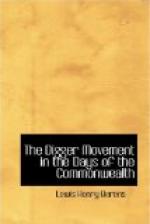“When these respective Post-masters have brought up their Bills or Certificates from all parts of the Land, the Receiver of these Bills shall write down everything in order from Parish to Parish in the nature of a Weekly Bill of Observation. And those eight Receivers shall cause the Affairs of the Four Quarters of the Land to be printed in one Book with what speed may be, and deliver to every Post-master a Book, that as they bring up the affairs of one Parish in writing, they may carry down in print the Affairs of the Whole Land.”
ITS BENEFITS.
“The benefit lies here, that if any part of the Land be visited with Plague, Famine, Invasion or Insurrection, or any casualties, the other parts of the Land may have speedy knowledge, and send relief. And if any accident fall out through unreasonable action, or careless neglect, other parts of the Land may thereby be made watchful to prevent like dangers. Or if any through industry or through ripeness of understanding have found out any secret in Nature, or new invention in any Art or Trade, or in the tillage of the Earth, or such like, whereby the Commonwealth may more flourish in peace and plenty, for which virtues those persons received honor in the places where they dwelt; then, when other parts of the Land hear of it, many thereby will be encouraged to employ their Reason and Industry to do the like; that so in time there will not be any Secret in Nature, which now lies hid (by reason of the iron age of Kingly Oppressing Government) but by some or other will be brought to light, to the beauty of our Commonwealth.”
With this suggestive passage this chapter may fittingly close. Like his great successor in the Nineteenth Century, Winstanley evidently realised that “Liberty means Justice, and Justice is the Natural Law—the law of health and symmetry and strength, of fraternity and co-operation.”
FOOTNOTES:
[197:1] Law Reform was at that time very popular, and undoubtedly much needed. The month previous to the publication of the book we are now considering, in January 1652, a Law Reform Commission consisting of twenty-one members had been appointed. It evidently went to work in a very thorough manner. For, according to a modern Lawyer, Mr. Inderwick (see his book The Interregnum, referred to by Gardiner), it appears that of eight draft Acts proposed on March 23rd, 1652, one became Law in 1833, one in 1846, and a third in 1885.




